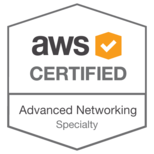AWS Certified Advanced Networking in 20 Days
Can the AWS Certified Advanced Networking Specialty exam be legitemately passed with only a few weeks of studying? Yes.
Is there a secret shortcut? No.
Although there is no shortcut, I will discuss my previous experience, study materials, and general impressions of the exam. If you have already been working with AWS networking, and wondering what it takes to be certified, this post should give you a pretty good idea. Regarding my timeline, I passed the AWS Certified Solutions Architect Associate exam on 10/18/18, and then passed the AWS Certified Advanced Networking Specialty exam twenty days later on 11/7/18.
1. Previous Experience
First, I've worked in "traditional" networking before starting my AWS experience, and have passed the Cisco CCNP and CCDP exams. This is a huge advantage if you are looking to take the AWS Certified Advanced Network Specialty exam (ANS), since the exam guide recommends the following "General IT Knowledge":
- Advanced networking architectures and interconnectivity options (e.g., IP VPN, MPLS/VPLS)
- Networking technologies within the OSI model, and how they affect implementation decisions
- Development of automation scripts and tools
- Routing architectures (including static and dynamic)
- Multi-region solutions for a global enterprise
- Highly available connectivity solutions (e.g., DX, VPN)
- CIDR and sub-netting (IPv4 and IPv6)
- IPv6 transition challenges
- Generic solutions for network security features, including WAF, IDS, IPS, DDoS protection, and Economic Denial of Service/Sustainability (EDoS).
90% of those topics are covered by the CCNP, and if you have worked in an enterprise environment, you have probably seen or used similar network security features listed on the last line.
Second, I have been working with AWS networking for about 4 years. This started out small, troubleshooting a security group, or creating a vpc, and growing to designing multi-account, multi-region network services and connectivity. This was supplemented by the knowledge I recently gained studying for and taking the AWS SAA exam. Even though an associate exam is no longer required to take a specialty exam, I would highly recommend it, so you can learn the AWS way of doing things "right".
2. Study Materials
Even with the experience described above, I did not immediately go and take the exam. For me, passing the exam isn't just filling in the correct answer, its learning the AWS approach to solving problems, and all the available solutions. I used two main resources to study for the exam:
- Linux Academy Online Course
- The AWS Certified Advanced Networking Official Study Guide
After using Linux Academy for the SAA exam, I was excited to try their ANS cource. Unfortunately I wasn't as impressed, maybe because I was already familiar with the material, but there also weren't as many labs, and the quizes towards the end felt lazy with only a couple questions each. Overall, I did find the material useful and mostly listened to the instructor at 1.25x or 1.5x speed while taking notes on important points. I still recommend Linux Academy as a general training resource, since I'm a fan of their on-demand labs and wide range of content.
If you are looking to get the most bang for your buck, I would definitely purchase the official study guide. The guide is written by seven AWS Solutions Architects, and I found the content very thorough. At the end of every chapter are resources to review, exam essentials, exercises and review questions. The book also includes online practice exams and flashcards. I recommend taking the practice exams over and over again until you genuinely understand each question and the correct answer.
Last, AWS provides whitepapers and various documentation that can also be used as study material. Near the end of my studying I also found more content on AWS Answers. For example, these articles on network connectivity:
3. General Impressions
I thought this was a difficult test. It isn't enough to know one solution to a given scenario. AWS expects you to know every solution to a scenario, the benefits and limits of each solution, and be able determine the best solution for the scenario. You need to deep dive into each subject. There were still times that I didn't 100% know the answer that AWS was looking for, and I had to make an educated guess. I think "Domain 5.0: Design and implement for security and compliance" from the exam guide was my biggest challenge. Unfortunately I can't go into more detail, as I don't want to risk violating the exam agreement. I am proud to have passed the AWS ANS exam, and I think it is worth pursuing if you work with AWS networking frequently.
Hopefully this post was helpful, if you'd like to discuss AWS networking, come find me at re:Invent 2018! I can be reached via Twitter.

PS. I also discovered a couple other blog posts with some amazing study content after I had already passed the exam:
https://blog.ashiny.cloud/2018/07/29/aws-certified-advanced-networking-specialty/
https://www.itdiversified.com/aws-certified-advanced-networking-prep-direct-connect/
https://www.itdiversified.com/aws-certified-advanced-networking-prep-vpc/
https://www.itdiversified.com/aws-certified-advanced-networking-prep-vpn/
https://www.itdiversified.com/aws-certified-advanced-networking-prep-route-53/
https://www.whizlabs.com/blog/aws-certified-advanced-networking-specialty-certification-preparation/
